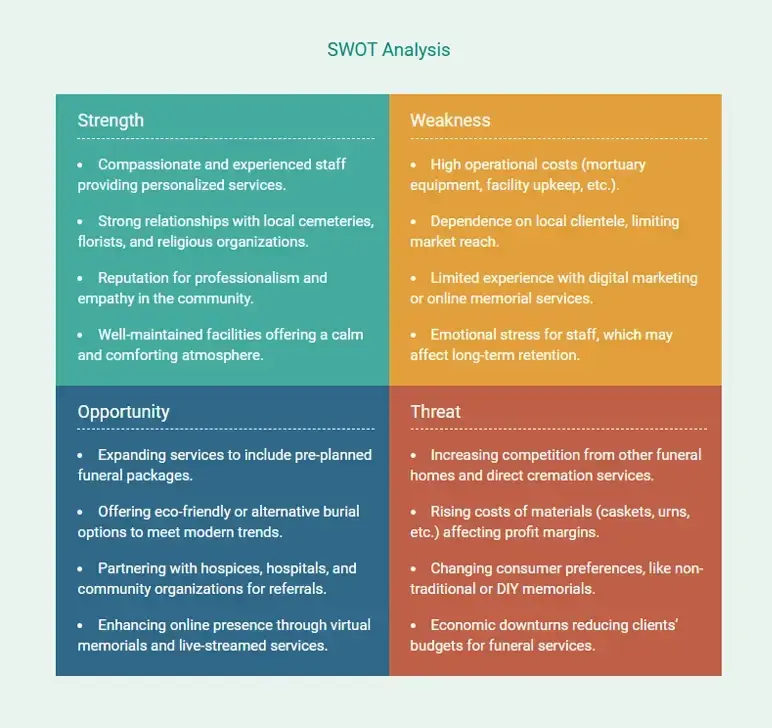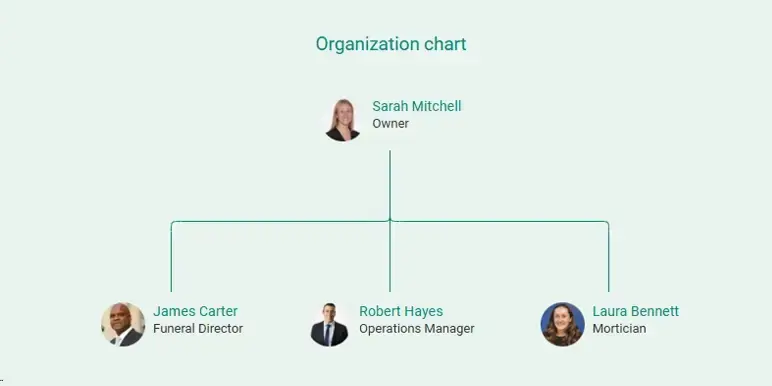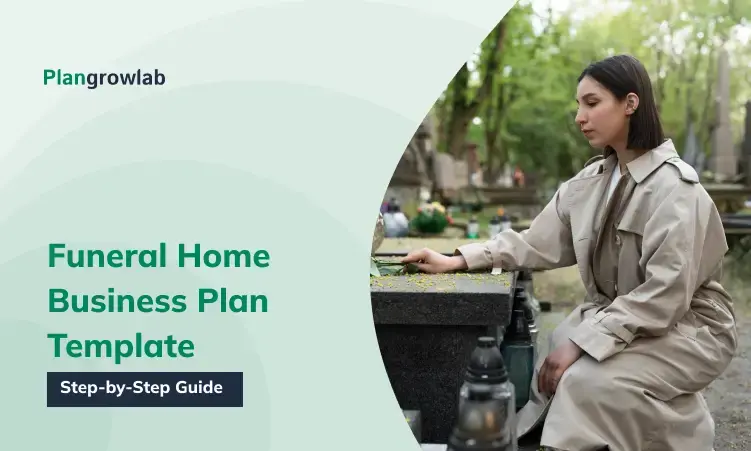A full-service funeral home business is more than just a business—it’s a place of comfort, support, and meaningful service for families during difficult times.
Turning that purpose into a clear business plan can feel like a big task. Anthony Skeen, owner of Skeen Funeral Homes, once faced the same challenge.
By focusing on his clients’ needs, setting clear goals, and planning for growth, Anthony built a strong foundation for his business.
Drawing from his experience, this guide will help you create a thoughtful business plan that supports both your mission and your success.
What is a funeral home business plan?
A funeral home business plan is a professionally written document that provides a foundation for starting and growing your funeral services business.
It includes your business vision, goals, services offered, marketing strategies, and financial plans all—presented clearly and concisely.
In short, it’s a strategic guide to help you stay focused, overcome obstacles, and achieve long-term success as you start a funeral home company and a new business.
Why do you need a business plan for a funeral home?
A well-crafted business plan is essential for running a successful funeral home business. It outlines your goals, strategies, and the steps needed to grow your business.
Here’s why a business plan for a funeral home matters:
- Set your goals: Define your mission—compassionate, personalized services, pre-planning arrangements, community involvement and partnerships—and how you’ll achieve them.
- Get funded: Attract investors or get loans by showing your financials, professional services, and market analysis, proving your funeral home is a good investment.
- Streamline operations: Organize daily tasks like scheduling services and staff and client consultations so everything runs smoothly and professionally.
- Be prepared for the unexpected: Identify risks — from fluctuating costs of materials to changing customer habits — and have a plan to mitigate them.
In short, a business plan keeps your funeral home-focused, financially secure, and ready for the long haul.
How to write an effective funeral home business plan?
Creating a business plan for a funeral home business involves outlining several key components (sections) that clearly explain your goals, vision, and strategies in a simple and organized manner.
Here’s a step-by-step guide:
1. Executive Summary
An executive summary is an intro to your funeral home business plan, summarizing your business and what sets you apart in the market.
Although it’s first, an executive summary is often easier to write last—after you’ve written the rest of the plan. This way, you can clearly highlight the key points.
Here’s what to include in your funeral home business summary:
- Business name and location
- Business concept
- Mission and vision statement
- Short-term and long-term goals
- Target market opportunities
- Unique selling points
- Financial projections
The goal of the executive summary is to capture the attention of potential investors and leave a good first impression.
Keep it short, simple, and to the point—show why your funeral home business is going to succeed.
“Writing the executive summary was harder than I thought—I had to be clear and concise while sharing my vision, business goals, and the families I want to serve.
I started by listing my ideas and then narrowed them down to the most important parts of my funeral home. After a few drafts I had a summary that reflected my mission and gave me the confidence to move forward with the rest of my business plan.”—Anthony Skeen
2. Company Overview
In the company overview section, introduce your funeral home business. Start with the basics: the name of your funeral home business, location, legal structure, and the services you offer – funeral planning, cremation, memorial service, etc.
Then share what makes your funeral home business different. Is it a traditional funeral home? Share your mission, your vision for the future, and what inspired you to start the business.
Mention your goals, like to expand your services, partner with local organizations or offer grief support. If you’ve already achieved any milestones such as securing a location, building relationships with vendors, or planning your first service—be sure to highlight those too.
Keep the company overview simple, clear, and concise. The goal is to help readers understand your business and feel confident about its purpose and future.
“While writing the business overview, I focused on clearly explaining what my funeral home business offers and what sets it apart without making it too complicated.
I highlighted our compassionate care, personalized memorial options, and dedication to supporting families during difficult times.
By organizing it into sections—our mission, key services, and core values—I was able to create a professional and heartfelt overview.”—Anthony Skeen
3. Industry and Market Research
Before you open your funeral home business you need to know the industry and this analysis shows you have done your homework.
When doing your research consider these key points:
- Market size: The funeral industry is always in demand because people will always need funeral services. With more people getting older and planning their end-of-life arrangements, the market for funeral services remains steady and reliable.
- Growth potential: The rise in cremation and the demand for more personalized funeral services offer good growth opportunities. Offering eco-friendly burials, cremation memorials, and unique ceremonies will set your funeral home apart.
- Regulatory requirements: There are laws and regulations you need to follow to run a funeral home including licensing, embalming standards, and health and safety rules. Follow these guidelines for credibility and business operation.
This research will help you find ways to offer unique, affordable, and eco-friendly funeral home services that meet the changing needs of families in your community.
“Entering the death care industry was both meaningful and challenging. I wasn’t fully aware of the latest trends or what made certain funeral homes stand out.
Instead of guessing, I took the time to learn—speaking with industry professionals, attending services, and understanding the needs of grieving families.
This hands-on approach helped me recognize the challenges, uncover opportunities, and shape my business strategy with confidence.”—Anthony Skeen
4. Customer Analysis
Customer analysis for your funeral home business means understanding the families you help and what they need.
Start by thinking about who your clients are. Are they families planning a traditional funeral, people looking to pre-plan their own services, or those wanting a more personalized memorial? Knowing this helps you offer the right support.
Consider what matters to your clients—affordable options, kind and caring service, flexible plans, or clear guidance through the process. That helps you tailor your services.
Also, think about how people find your funeral home business. Do they hear about you online, through social media, from friends and family, or through referrals from churches or healthcare providers? That helps you focus your marketing.
If helpful, create a simple “buyer persona” to better understand the families you serve—like those wanting simple, affordable services versus those wanting unique, personal touches.

By knowing your clients you can offer meaningful services, set fair prices, and build trust in your community.
“At first, I found it challenging to identify my target customers for the funeral home. Was it families planning traditional services, individuals arranging their own pre-planned funerals, or those seeking unique memorials? It felt unclear.
Things started to come together when I shifted my focus to what my target customers genuinely needed—empathetic support, personalized options, and clear guidance.
Once I realized that, everything started to fall into place.”—Anthony Skeen
5. Competitive Analysis
This part of your business plan looks at your competitors and shows what makes your funeral home business special.
Start by listing your direct competitors— like other funeral home businesses in your area that offer similar services.
Look at what they do well like affordable packages or peaceful locations, and where they fall short, like limited options or high prices.
Also, consider indirect competitors, like community centers, churches, and other religious organizations that hold memorial services.
By understanding your competitors, you can find gaps in the market and highlight what sets your funeral home business apart, such as personalized services or unique memorial options.
Additionally, conducting a SWOT analysis (Strengths, Weaknesses, Opportunities, and Threats) will help identify your business’s internal advantages and challenges while uncovering external opportunities and potential risks.

This will help you explain why families should choose your funeral home business for their loved one.
“Learning about my competitors helped me spot important gaps in the funeral service market. I noticed that many funeral homes provided basic services but often missed the personal touch families needed.
By offering customized memorial services and compassionate, flexible support, I found a way to set my funeral home business apart.”—Anthony Skeen
6. Marketing Strategy
Your marketing plan shows how you’ll support families, get new clients, and grow your funeral home business.
Start by listing how you’ll tell people about your services. Here are some ideas:
- Use social media to connect with families, share information, and let people know what you offer.
- Advertise locally with flyers and simple ads, and host or join community events to build trust.
- Work with local churches, hospices, and healthcare providers so they can refer families to you.
- Offer discounts for pre-planned services so families can plan with confidence.
- Encourage families and communities to refer to your services with small rewards.
A clear and simple marketing plan will help you build relationships, attract clients, and grow your funeral home business over time.
"Developing my funeral home’s marketing plan was about more than just strategies — it was about connecting with people.
By focusing on community outreach, building relationships with local hospices, and having a welcoming online presence I had a way forward.
It gave me the confidence to grow my business and serve more families with care." — Anthony Skeen
7. Operations Plan
The operations plan explains how your funeral home will run each day.
This includes service planning, staff roles, client support, and working with vendors.
Start by explaining how you'll prepare for services, like scheduling funerals, setting up memorial spaces, getting transportation, and making sure everything is ready for the families you serve.
Explain how you’ll handle client interactions from the first meeting to discuss funeral arrangements through the planning process and during the actual service.
Mention how you’ll work with vendors like florists, caterers, and cemeteries and how you’ll coordinate with them to make sure every service goes smoothly.
Lastly, outline your staffing needs such as a funeral director to guide families, support staff to set up services, and maintenance staff to keep the facility clean and welcoming.
Keeping everything organized will help create a comforting and professional experience for your clients.
“At first it all seemed like a lot to do – from meeting with families and planning services to coordinating with florists and cemeteries.
I simplified it by breaking it down into 3 steps – responding to inquiries, finalizing arrangements, and overseeing memorial services.
I created a checklist for each funeral, and that helped me stay organized and make sure every family got the care and attention they deserved.”—Anthony Skeen
8. Management Team
In this section, you’ll explain who runs your funeral business and how you’ll manage the daily tasks.
If you’re running the business on your own, describe how you’ll do everything – like plan funerals, work with families, marketing, customer service, and day-to-day operations.
Talk about your skills, education, and experience that prepare you to manage a funeral home business.
If you have a team, introduce the main roles – like a funeral director, office assistant, or grief counselor – and describe how each person will help keep the business running and support your clients.
You can also add an organizational chart to show how everyone works together.

Keeping the structure clear helps make sure everyone knows their role, leading to smooth operations and good customer service.
“When I first started my funeral business it was a small team – just me and a few others doing the day-to-day tasks.
I soon realized I needed to outsource key roles like marketing and administrative support to keep everything organized.
Starting small worked well but as the business grows I plan to bring on more staff in operations, client care, and community outreach to support the families we serve.”—Anthony Skeen
9. Financial Plan
This section gives a clear financial overview of your funeral home business for the next 3 to 5 years, helping you understand how your business will grow and perform.
When creating the financial plan for your funeral home business plan, include these key points and financial statements:
- Profit and loss statement (Income statement)
- Cash flow statement
- Projected balance sheet
- Break-even analysis
- Funding needs
- Operating expenses
You can also add revenue estimates, sales forecasts, startup expenses, and how you plan to repay any loans.
Simply put, having clear financial projections will show investors that your funeral home business is built to grow and succeed over time.
“Developing the financial plan was a challenging step, as I had to estimate startup costs, set service prices, and forecast cash flow without much data at first.
It wasn’t easy to predict both expenses and potential revenue accurately. To work through this, I researched industry pricing for funeral services, memorial packages, and other offerings.
I also looked into local competitors and used financial planning tools to get a clearer picture of what my funeral home business would need to operate and grow.”—Anthony Skeen
Download a free funeral home business plan template
Ready to start drafting your funeral home business plan but need a little extra help? We’ve got you covered! Download our funeral home business plan template in PDF to get started.
This investor-friendly template has guided hundreds of funeral home business owners in creating successful plans. With clear examples and practical tips, this template makes the funeral home business plan writing process smoother and more efficient.
Get help writing your plan
Now that you've explored the guide and a free template, creating your funeral home business plan should feel more manageable.
If you're still unsure about certain details or seeking professional support, consider connecting with our business plan consultants. Our team of experts will help you fine-tune your plan, ensuring it includes all the key elements investors look for.
So, why wait? Get a quote today!
Frequently Asked Questions
What primary services should a funeral home offer?
A funeral home should provide services like:
- Funeral planning
- Memorial services
- Cremation services
- Burial arrangements
- Embalming and body preparation
- Transportation of the deceased
- Pre-planning services
- Grief support and counseling
Personalized services can also help meet the unique needs of each family.
How to attract customers to your funeral home?
To attract customers to your funeral home business, build trust, have a clear website, offer personalized services, and connect with the community. Positive reviews also help.
What key elements should be covered in my funeral home business plan?
The key elements that should be covered in your funeral home business plan are:
- Executive summary
- Business Overview
- Funeral home industry research
- Funeral home market research
- Customer and target market analysis
- Competitive analysis (both indirect and direct competitors)
- Marketing strategy
- Operations plan
- Management team
- Financial plan
Is it worth hiring professional business plan writers or consultants?
Yes, hiring a professional business plan writer can be worthwhile if you need a solid business plan to attract investors and lack the time to create one yourself. However, if you're on a tight budget, using a funeral home business plan template is a practical and cost-effective alternative.
How do I create a pricing strategy for funeral services?
To create a pricing strategy for funeral home services, research local competitors, calculate your costs, and offer tiered packages to suit different budgets. Include value-added services like personalized memorials and ensure pricing is clear on your website and brochures. Regularly review and adjust prices based on market trends and client feedback.

